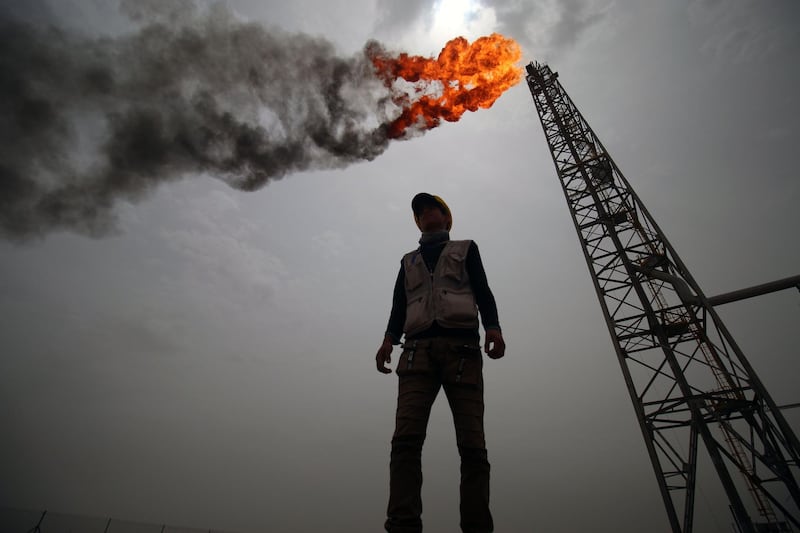Iraqi elections are not decisive, but just a basis for further negotiation.
The latest instalment, voted on last Saturday, has turned up surprises, some grounds for hope and some disillusionment. Convoluted coalition-building is expected, but Muqtada Al Sadr’s strong showing complicates the prospects for economic reform and, above all, the vital energy sector.
The main results are now clear, though a few seats could change with recounts and legal challenges. Mr Al Sadr’s "On the Move" (Sairoun) alliance, with the Communists, won 54 seats in the 329-member parliament. He campaigned on an populist, anti-corruption platform and benefited as his support held up while turnout for others slumped.
Current prime minister Haider Al Abadi’s Nasr bloc won 42 seats; the militia-dominated, Iran-aligned Fatah list of Hadi Al Ameri, 47; former prime minister Nouri Al Maliki’s State of Law 25; and various Kurdish, cross-sectarian, minority and other parties the remainder.
The disappointing turnout reflected voter apathy, as well as intimidation and vote-rigging particularly in the Kurdish areas. Mr Abadi, who defeated ISIL and retook Kirkuk from the Kurds, was undone by a lack of economic results. But more encouraging was the success of some parties in picking up seats across the sectarian divide, and the stronger focus on achievements rather than identity politics.
It is mandatory for western media to refer to Mr Al Sadr as a “firebrand”, but his politics have undergone considerable evolution. His movement is less vocally anti-American, he now calls for a technocratic, non-sectarian government not beholden to Iran, and met Saudi crown prince Mohammed bin Salman in Riyadh last year.
He has ruled out joining with Fatah or with Mr Maliki, although such declarations are never final. That still leaves room for Mr Abadi to return as prime minister, though more beholden to the Sadrists this time.
The new government will have more financial room for manoeuvre because of the rise in oil prices and winding-down of the war. That also means more scope for corruption and populist hand-outs. Mr Al Sadr’s campaign promised stronger, technocratic governance, but unwieldy and ineffective coalitions, graft and patronage are ingrained in the modern Iraqi political system.
A government containing a heavy populist element is likely to suspect foreign investment and prefer heavy state employment, high current spending and budget deficits.
This would be contrary to Iraq’s clear needs. Energy subsidies and overstuffed state employment should be phased out in favour of direct cash payments to the needy, paying down debt, accumulating sovereign wealth to buffer the economy, and investing heavily in infrastructure and education. Improving the country’s dismal electricity and water situation should be a goal that technocrats and populists alike can get behind.
_______________
Read more:
Clear thinking required as sanctions loom for Iran
Angola at crossroads as new broom sweeps economy
_______________
Bureaucracy, which invites inefficiency and corruption, should be simplified – particularly the absurd visa system. The Iraqi private sector needs to be strengthened, including big potential employers such as tourism, agriculture and industry. Sectors which are attractive for foreign investment should be enabled to use it, instead of sucking up scarce state funds.
The key one of these is petroleum. After prime minister, oil minister is one of the five key positions alongside foreign affairs, defence, finance and interior. The current incumbent, Abdul Jabbar Al Luaibi, running for MP, came in first on Mr Abadi’s list in Basra.
But this time the choice is complicated by the law passed in March, but not yet implemented, re-establishing the Iraq National Oil Company (Inoc). This was promoted by Ibrahim Bahr Uloum, former oil minister and parliamentary candidate on the Fatah list. It would give enormous powers to the chairman, who would hold ministerial rank, and would be able to decide how 10 percent or more of oil revenues would be distributed.
Re-establishing a dedicated national oil company, and moving operational responsibility to it from the ministry of oil, is a good idea. But as currently worded, the law is a recipe for turf battles between Inoc and the ministry. The relative political strength of the next minister and chairman, and the party machines behind them, is therefore very important. Sadrists have often refused to meet foreign oil companies, but the aphrodisiac qualities of power may change that, and in any case there are ways round their objections.
The upstream oil and gas sector needs the go-ahead on major supporting projects of water injection and export facilities. To diversify the fiscal and export base, and create employment and technical skills, gas processing, world-scale oil refineries and petrochemicals are key next steps. The shape of a deal with the Kurds will depend on the eventual coalition, but would stabilise the autonomous region’s economy and unlock oil exports from the Kirkuk area.
Iraqi relations with Saudi Arabia have improved under Mr Abadi, and Mr Al Sadr’s rapprochement with Riyadh, too, suggests that under their leadership, the country would remain in its admittedly imperfect compliance with the Opec deal on production cuts.
In the current heightened regional tensions with Iran, Baghdad will aim as usual to play off its big neighbour, the US and other Arab countries. In contrast, a government featuring Mr Maliki and Mr Al Ameri would tilt much more to Tehran.
Iraq might benefit to some extent from sanctions on Iran, which raise oil prices and create smuggling opportunities. But it would quickly be sucked into the maelstrom of any regional conflict.
Iraqi voters have at last the luxury of deciding on bread-and-butter issues, but whatever new government they get needs to heed their message.
Robin M. Mills is CEO of Qamar Energy, and author of The Myth of the Oil Crisis






